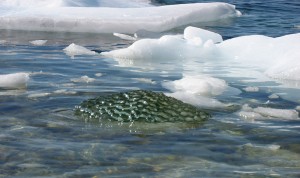 Like the other photos for Saturday mash-ups, this one is picked not for its relevance but just because we like it. It’s a photo of a “black ice growler from a recently calved iceberg closing in on the shore at the old heliport in Upernavik, Greenland. Such black ice growlers originate from a glacial crevasse, which has been filled with melting water, which has then frozen into transparent ice without air bubbles.” (By Kim Hansen via Wikimedia Commons.)
Like the other photos for Saturday mash-ups, this one is picked not for its relevance but just because we like it. It’s a photo of a “black ice growler from a recently calved iceberg closing in on the shore at the old heliport in Upernavik, Greenland. Such black ice growlers originate from a glacial crevasse, which has been filled with melting water, which has then frozen into transparent ice without air bubbles.” (By Kim Hansen via Wikimedia Commons.)
- Why are we irritated with the Huffington Post’s “Post-50” section? No good reason. Still, we are, except we like the coverage of Kirk and Cindy Sinclair, who have trekked all 6,800 miles of “the little-known American Discovery Trail.” (See, right there. The Discovery Trail is pretty much undiscovered. That’s funny…but HP P-50 is irritatingly oblivious.) We like this because the Sinclairs sound like nice people (Kirk writes a “Kindness Blog” for his web site, the Hiking Humanitarian), the challenge of a cross-country slog is appealing, and the ADT is a discovery for us, too (though we question the assertion that it offers “thousands of historically, culturally and/or naturally important sites.” Thousands? So, roughly every three miles there’s something important?).
- If you’re not able to walk the country, try visiting some of the best places via webcam. A 24/7 HD camera trained on North America’s highest waterfall, the 2,425-foot Yosemite Falls, just came online. It’s updated every 30 seconds, so it’s not as satisfying as true video, but it’s still pretty nice. The camera was set up by the nonprofit Yosemite Conservancy. Check it out, then visit some of the other webcams set up throughout the National Park Service. (An incomplete list can be found here.) And try the interactive trail-views created by Nature Valley.
- On the assumption that old people like old things, we note that the “oldest known water vessel in Atlantic Canada, built about 60 years after Columbus landed in North America” has been installed at the New Brunswick Museum in Saint John, NB. The restored “450-year-old aboriginal canoe” was discovered six-years ago by a couple walking on the beach. They were advised to keep it wet, which they did by dunking it in a stream until they convinced conservationists to “infuse the wood’s cells with a plastic polymer to keep the vessel from drying out and preserve its structural integrity.” Hat’s off to all involved.
- You can choose to believe that the earth is not warming. The U.S. Forest Service cannot, because the changing climate is affecting their business, which is overseeing the nation’s forests, which in some states are being attacked by a beetle infestation that is tied to warmer weather. The Washington Post reports that “some regions of the Northern Rockies have experienced an 80 percent die-off of whitebark pines, and the Natural Resource Defense Council projects that between 80 and 100 percent of remaining trees in some areas will be killed by mountain pine beetles, whitepine blister rust or a combination of the two.” The Forest Service is scrambling to find a fix, but one University of Colorado scientist adds this chilling assessment: “There is certainly nothing that’s going to work to protect millions of acres of these high-elevation trees.”









